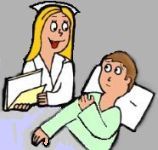The differences between adults and children
 Another obvious entry - perhaps. I used to work in a children's hospital and I enjoyed spending time in the orthopedic clinics. I particularly enjoyed splinting, casting, and fracture bracing. The best part was that despite having broken bones the kids were almost universally interested in getting back to their typical occupations. It was important to work with the orthopedic surgeon to make sure there was appropriate stability, but then we got to educate the family on how to reign in the energy of a 3 year old even though they had a long leg cast on, or talk about how to secure the child in a car seat with the cast, or how to take care of toileting needs. The interventions were direct, practical, and there was almost always the exact result that you expected. Kids heal well, they heal fast, and they don't like to wait while that healing process is proceeding.
Another obvious entry - perhaps. I used to work in a children's hospital and I enjoyed spending time in the orthopedic clinics. I particularly enjoyed splinting, casting, and fracture bracing. The best part was that despite having broken bones the kids were almost universally interested in getting back to their typical occupations. It was important to work with the orthopedic surgeon to make sure there was appropriate stability, but then we got to educate the family on how to reign in the energy of a 3 year old even though they had a long leg cast on, or talk about how to secure the child in a car seat with the cast, or how to take care of toileting needs. The interventions were direct, practical, and there was almost always the exact result that you expected. Kids heal well, they heal fast, and they don't like to wait while that healing process is proceeding.I contrast this to working with adults who (as a population) respond very differently to a fracture than a child. Adults hold their broken extremities out like wounded paws. They don't generally rush back into activities. They take time off of work. Accordingly, the also develop complex regional pain syndrome at higher rates and have more complications. An adult who fractures their humerus may need therapy to strengthen the shoulder and to improve range of motion in the elbow. Most kids never need anything. Even when children do need therapy, they generally only need to be followed once a week to monitor a home program. I find this to be generally true even when there are temporary nerve problems that sometimes occur during pediatric supracondylar fractures.
This is on my mind because my daughter, who despite being instructed otherwise, decided to pretend to be Tony Hawk with her cousin's skateboard. As a result she fractured her left clavicle. There is little to be done about it other than wear a sling and suffer for a few weeks. She is undaunted though, and presently banging away on her drum kit upstairs to see if she will be in good shape for her upcoming concert.
Perhaps if everyone was like this there would be less of a reason for occupational therapists!


Comments
Hope the kid is doing ok.